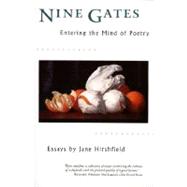A Gate Enables passage between what is inside and what is outside, and the connection poetry forges between inner and outer lives is the fundamental theme of these nine essays.
Nine Gates begins with a close examination of the roots of poetic craft in "the mind of concentration" and concludes by exploring the writer's role in creating a sense of community that is open, inclusive and able to bind the individual and the whole in a way that allows each full self-expression. In between, Nine Gates illumines the nature of originality, translation, the various strategies by which meaning unfolds itself in language, poetry's roots in oral memory and the importance of the shadow to good art.
A person who enters completely into the experience of a poem is initiated into a deeper intimacy with life. Delving into the nature of poetry, Jane Hirshfield also writes on the nature of the human mind, perception and experience. Nine Gates is about the underpinnings of poetic craft, but it is also about a way of being alive in the world -- alertly, musically, intelligently, passionately, permeably.
In part a primer for the general reader, Nine Gates is also a manual for the working writer, with each "gate" exploring particular strategies of language and thought that allow a poem to convey meaning and emotion with clarity and force. Above all, Nine Gates is an insightful guide to the way the mind of poetry awakens our fundamental consciousness of what can be known when a person is most fully alive.
"It is the quiet restraint of these writings--poems and prose--that appeals. Recommended." - Library Journal








